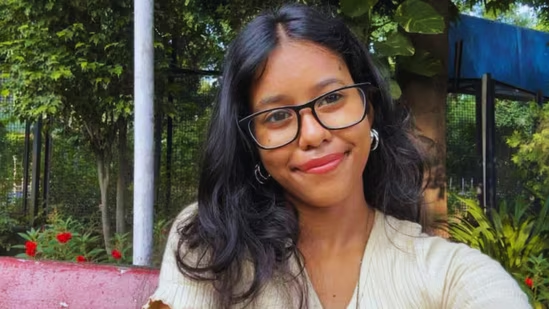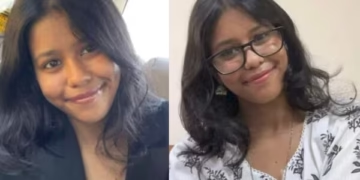Moments before her tragic end at Delhi’s Signature Bridge, Sneha Debnath from Tripura made an emotional final call to her family. Discover what she said, the events leading up to it, and why her story has gripped the nation.

What Tripura’s Sneha Debnath Told Family in Her Last Call Before Heading to Delhi’s Signature Bridge
On the morning of July 7, 2025, 19‑year‑old Sneha Debnath—a Delhi University student hailing from Sabroom, South Tripura—made her final known call to her mother. She shared what she planned next: a visit to Sarai Rohilla Railway Station with a friend named Pitunia before boarding a cab to Delhi’s Signature Bridge. That was the last anyone heard from her.
The Final Phone Call: 5:56 a.m., July 7
At 5:56 a.m., Sneha phoned her mother. Calmly, she said she’d accompany Pitunia to Sarai Rohilla station—a claim which later unraveled. By 8:45 a.m., when her family tried reaching out again, there was no answer; her phone was off. Not long after, Pitunia denied ever meeting her: no rendezvous, no station walk.
Tracing Her Steps: Cab Ride to Signature Bridge
With no contact and no confirmed meeting with Pitunia, the family traced Sneha’s cab booking. The driver confirmed dropping her at Signature Bridge, a location infamous for suicide attempts. He recalled: “Just before we reached, she got a call… about five minutes before I dropped her. After dropping her, she walked toward the bridge. I turned around, came back ten minutes later, and there was no sign anything happened”.
Disturbing Silence: CCTV Failure and Jurisdiction Gaps
Despite Delhi Police claiming over 60 CCTV cameras were installed around the bridge, Sneha’s family found none were functional that day—including even those meant for speed monitoring—leaving a gaping void in surveillance. Family and friends expressed deep concern:
- “Despite the Signature Bridge being a suicide‑prone area, there is not a single CCTV camera that works”.
Adding to the confusion was the bridge’s location under four to five different police stations, hampering prompt action due to unclear jurisdiction.
Emotionally Distressed: The Note & Suspected Suicide
Investigators found a handwritten note at Sneha’s residence, indicating her intention to end her life:
“I feel like a failure and burden… decided to end my life by jumping from Signature Bridge… no one’s fault but mine. There is no foul play, this was all my decision.”.
Yet, some family members expressed skepticism. Her sister Bipasha said:
“If she really wanted to die, lots of ways to do it at home… You don’t have to go all the way to a place where 60 cameras are not working… Someone could have manipulated her”.
Who Was Sneha? A Bright Overachiever from Tripura
Sneha was described as extremely bright and ambitious, majoring in Mathematics at Atma Ram Sanatan Dharma College, DU. She was simultaneously pursuing a data science and programming course at IIT Madras and interning with an Australian firm. According to her LinkedIn profile, she “loves talking about anything related to Mathematics, computers and the anime Monster”.
Her father, Lt. Subedar Major (Hon) Pritish Debnath (Retd.), is undergoing dialysis for chronic kidney failure. The family shared heartbreaking details: Sneha left home without personal belongings and hadn’t withdrawn or used any money in four months, fueling questions about how she sustained herself.
Search Operation and Tragic Recovery
With no leads, her family filed a missing person report under kidnapping. The Tripura Chief Minister’s Office intervened, coordinating closely with Delhi Police and the National Disaster Response Force (NDRF).
Search teams combed areas from Nigam Bodh Ghat to Noida. After six days, on the evening of July 13, Sneha’s body was discovered in the Yamuna River, beneath the Geeta Colony flyover, around 10 km downstream of Signature Bridge. Her family confirmed the identification and a post-mortem was ordered to confirm cause of death.
Family’s Response: Demands and Doubts
Reeling from the loss, Sneha’s family demanded accountability:
- Fix all CCTV cameras at Signature Bridge and surrounding zones.
- Clarify jurisdiction—ensure one dedicated police station handles emergencies.
- Full transparency in the investigation.
Her sister said, “It is unacceptable… we have no leads because the only concrete form of evidence… is not available”.
Their concerns highlight larger societal issues: mental health in students, surveillance infrastructure, and law enforcement coordination in public safety hotspots.
Broader Reflections: Mental Health, Infrastructure & Policy
Experts and civil groups warn this tragedy underscores urgent challenges:
- Strengthen mental health support—particularly for young, ambitious students facing emotional distress.
- Ensure constant CCTV coverage in suicide‑prone areas.
- Assign clear police jurisdiction for swift response.
There are also calls for awareness campaigns, crisis helplines, counseling services, and campus mental‑health units to detect and support students in turmoil.
Sneha Debnath’s death is a deeply tragic reminder: a young scholar brimming with potential, possibly overwhelmed by internal struggles, took a fatal step—within an environment lacking both mental‑health support and essential surveillance infrastructure. As Delhi Police wraps up its probe, many await answers to the unanswered: what led her to that moment, were any signs missed, and will her death spark meaningful reforms? Her family’s demands for accountability—and her peers’ pleas for better mental‑health awareness—resonate with urgency across the country.
If you or someone you know is struggling emotionally, please do reach out. India has several helplines, like AASRA (022 2754 6669), Sneha India Foundation (+91 44 4264 0050), and SANJIVINI (011 2431 1918), offering free and confidential support.
READ ALSO…..Actor Inam-ul-Haq Breaks Silence on Shocking Murder Case After Viral Music Video with Radhika Yadav Hits 5 Million+ Views















 Categories
Categories









